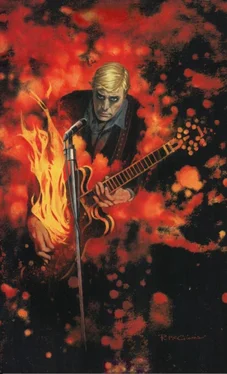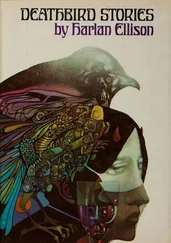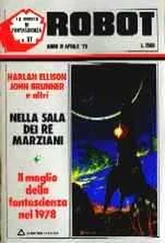Shelly crushed the cigarette underfoot. Perhaps this was the moment of truth. Perhaps this might be the story Shelly had suspected might be there. He’d wet-nursed this kid for weeks through all the training, all the publicity preparations, but had gotten no closer to him. Maybe this would be the moment when he could work up some warmth for Stag Preston.
“You really want to make it, don’t you, kid?”
Stag nodded. There was a softness in his smile now. “Ah sure do, Shelly. Ah never wanted anythin’ so much in all my life. You don’t know how bad I had it … really bad…”
Shelly sat down on the bench beside the boy and lit another cigarette. His dark, searching eyes probed Stag Preston’s face, looking for some things. For an instant he thought he found them.
“Tell me, will you, Luther? Tell me what you can, how about it? I’d like to know. I mean, we’re … friends now, as much as business partners. We should know about each other.”
The boy toyed with his full lower lip, worrying it with his teeth. Then he pursed his lips and nodded okay. “I s’pose you’re right. I never told anyone what it was like, mostly maybe because nobody could do anythin’ about it.”
Shelly waited. A silence.
Beyond the locker room doors the sound of a combo striking up broke the hush. The show was beginning; but Stag Preston was the smash finale, so they had time—perhaps too much time. Shelly listened.
“I’ll tell ya about my father, Shelly. That’s the important part. My old man was a gas, Shelly. He was the end, the livin’ end. He came outta the oil fields—Burkburnett, Texas, how about that—and joined the Army, spent about eleven years pushin’ stripes up his arms. Then he got mustered out at Fort Knox, met my old lady and decided to stay in Lou’ville. Except what he never told my old lady was that he’d been sick once, overseas somedamnplace and they’d put him on narcotics, some kinda junk I don’t know, and he’d got hooked. That was why he got mustered outta the service. He was a real junkie. Spent ev’ry cent he made packin’ in the dust.
“Finally he pulled off a good one … got my old lady on the stuff. It’s like when one of ’em has it he wants to give it to evr’ybody in sight. So my old lady got turned on, and one day the court just sent me off to the Home, took Pop and my old lady away and that was it.
“I busted out, made it on my own, and that was when I met the Kemps—” he stopped, remembering his final encounter with Asa Kemp and his wife. It stopped him. He subsided. Finally, he added, “I don’t want no pity, no handouts. I can make it on my own; I always have. I can make it, all I need is the chance.”
He stared up at Shelly with a mute pleading … and still that diamond glint of something else.
Shelly felt pity nonetheless. Father a junkie, mother obviously so helplessly in love with the man she stood still for anything, even to becoming as sick as her mate. The kid a product of orphan or reform homes … no love … no direction … no friends … yes, there was room to admire and respect and love Stag Preston. If it was possible to cut away the hungry desire, the fat on his soul, then it might be possible to strike up a rapport with the naked, lonely child that remained.
Shelly put an arm around the boy, squeezed his shoulder. “Take it slow, kid. You’re going to crack-em-out completely tonight.” He punched Stag lightly on the biceps and rose to go.
Stag Preston’s eyes were moist, and they looked at Shelly with a fierce friendliness. Shelly moved to leave.
“Hey, Shelly … ?”
He paused, turned. Stag was still staring at him.
“Thanks, Shelly.”
He winked, turned and walked back out through the swinging doors.
On the stage the TempTones were belting out a song whose lyrics perhaps only Lumumba could decipher. In the front row the A&R men were bored. Sid Feller of ABC-Paramount was the only one making a valiant effort to stay awake; he kept blinking rapidly, opening his eyes very wide every few seconds. Finally, in desperation, he began rubbing at an eye, murmuring, “Damn contact lenses itch,” to Joe Goldberg of Prestige Records. Goldberg nodded, stifling a yawn. The Colonel had his eyes closed. Shelly stepped out through the gym’s side exit to have another smoke.
Up there, the stars. Down here, another one getting ready to go nova. Shelly Morgenstern lit up, drew deeply, and pondered absolutely nothing at all. Except maybe the inner workings of hatred, and how foolish it was to become part of that mechanism. To hate Stag was folly; he was a kid, simply a kid. He wasn’t the ogre Shelly had begun to envision, endowed with the cunning and ruthlessness of an animal. He was a lonely, unhappy kid with a lousy background and a drive to succeed that seemed out of line next to the torpid desires of most people. But he wasn’t a monster. Not at all.
Shelly lipped the butt a final time, snapped it away. It hit the gray expanse of the basketball court, showered lovely orange sparks in a wide fan, and was carried away by the ground breeze. Shelly sighed once, deeply, and looked at the stars.
The ethical structure of the universe. How does it apply to you and me … you and I … Adelaide’s Lament … a community theatre in Ridgewood, New Jersey … a girl in the bushes with a best friend … she had to put a cat out for the night while the neighbors were away … thoughts .
He caught himself. Stream of consciousness is all right if your name is James Joyce, but if it’s Sheldon Morgenstern, keep them thoughts on Carlene (whom you are keeping, but whom you have not seen since before Louisville), on the Mercedes-Benz (which you are paying on, but haven’t driven since before Louisville), on the kid in there who is climbing into his Continental suit, this very moment (a kid who has taken up your time completely, since Louisville). Thoughts. The bane of the working classes.
Shelly sighed again, turned to the gym door and swung it open. His foot was in the air when the final thought— completely divorced from the others—came through:
Jeanie Friedel.
Bam!
Just like that. He saw again the look Stag Preston had given her at the contract-signing. It had been a glimpse of another face entirely. Someone else’s face. The unfamiliar. Then Shelly stepped through into the gym.
For comparison, Mandle had collared a local Cleveland talent, a singer named Bub Walthers; a kid who had come up with a mild success that Paul Anka had covered after its fourth week on the air (and had gone over 3 of a million with it). That had been Bub Walthers’s sole claim to fame; still, he was a local hero. And good comparison for what was to come.
Walthers finished his number, took a smattering of applause that was more reminiscence and lost glory than fervor, and bowed off the stage.
Then Mandle came on again. His face was so well-scrubbed Shelly thought he might have done it with a Brillo pad.
He took the mike in both hands, bending the stand toward himself, and a tone of such sincerity, such camaraderie suffused the gym that even the A&R men sat a little straighter. Sid Feller said to hell with it, popped the offending contact lens out into the palm of his hand, rubbed his eye till it watered, and proceeded to cleanse it by putting it on his tongue and washing it with saliva. As Mandle went on, the Am-Par A&R man pulled up his eyelid and snapped the invisible hemisphere of optical glass back in. Satisfied, he settled back, an expectant tilt to his head. If there was anything here, he was going to get it on paper; he caught the female executive of one of the other majors staring at him, gauging him. He intended to beat her out. Mandle was still talking.
Whatever it was that Bob Mandle said, in announcement of the mystery guest, Shelly did not hear it; only that all-pervading warmth filling the gym. Mandle snapped his fingers, the combo struck its intro notes—monotonous, infectious, basic—and the curtain swept back to reveal Stag Preston.
Читать дальше












